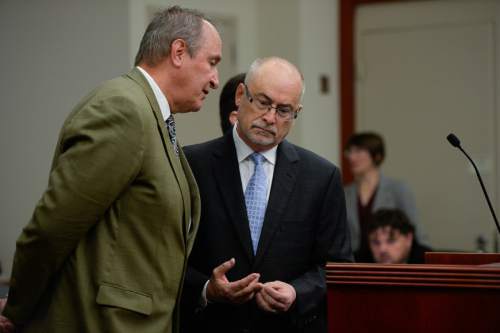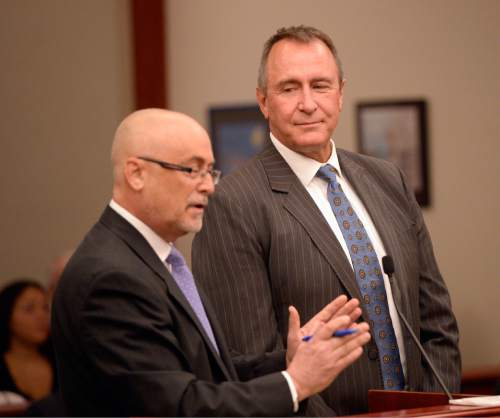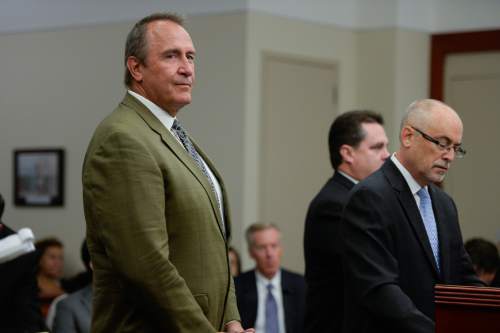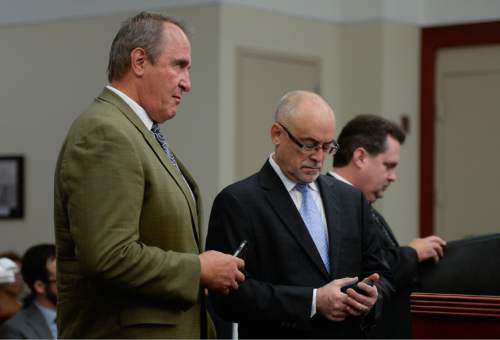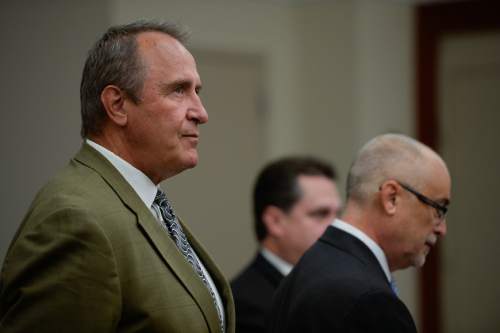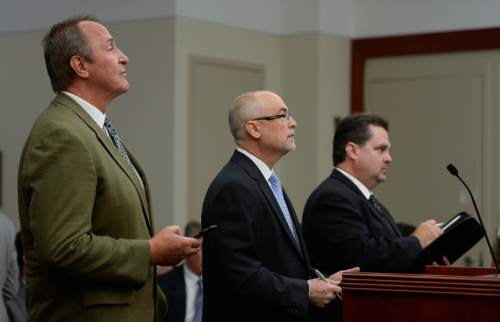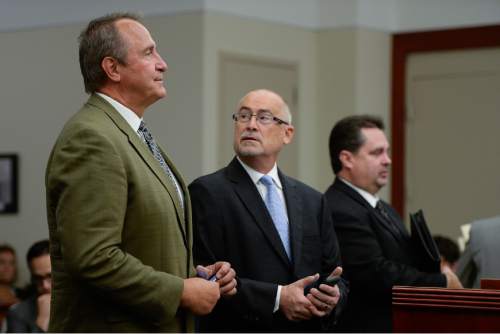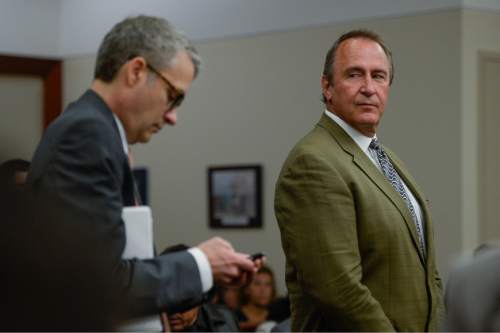This is an archived article that was published on sltrib.com in 2016, and information in the article may be outdated. It is provided only for personal research purposes and may not be reprinted.
A state judge dismissed criminal public corruption charges against Mark Shurtleff on Wednesday, ending the former Utah attorney general's two-year legal tussle.
Third District Judge Elizabeth Hruby-Mills signed the order, citing a state motion seeking the dismissal from the chief prosecutor, Davis County Attorney Troy Rawlings.
The dismissal was granted without prejudice, meaning the case could be filed again, although that seems unlikely.
"#Hallelujah! #Justice! #gratitude," Shurtleff, a three-term attorney general, exclaimed on Twitter.
In a statement, his lawyer Richard Van Wagoner said while Shurtleff was "delighted" by the judge's order, he was "disappointed" the court reached its decision based on Rawlings' motion, not those filed by the defense team.
"[Shurtleff] believes the state clearly saw the writing on the wall and at the very last minute filed its own motion to dismiss as a means to avoid having the court address the merits of Mark's substantial motions," Van Wagoner said. "The state's own motion expressly adopted much of the rationale set forth in Mark's motion to dismiss."
By acting on Rawlings' motion, instead of the ones from Shurtleff's attorneys, the judge also precluded the defendant from tapping a Utah law to get taxpayer help in paying his legal costs.
In a text message to The Salt Lake Tribune late Wednesday, Shurtleff said he and his attorneys will "discuss what we might do to get the fees paid."
A parallel case against Shurtleff's handpicked successor is proceeding. Salt Lake County District Attorney Sim Gill, a Democrat, reaffirmed Wednesday that his prosecution of former Attorney General John Swallow won't be affected by the Shurtleff dismissal.
In fact, Shurtleff could be a witness in that case and others.
Rawlings cited that ongoing "cooperation agreement" — in which the former officeholder said he would provide information and testify in other matters — among the reasons to dismiss the case.
Filed on July 18, the Rawlings motion also pointed to a recent U.S. Supreme Court ruling that narrows the scope of potential prosecution for political corruption, along with his inability to pry possibly key evidence out of federal hands, and concerns about potential violations of Shurtleff's right to a speedy trial.
"When a prosecutor determines, for reasons based on fact or law, including constitutional provisions, that there is no longer a reasonable probability of conviction, the case is over."
Shurtleff's attorneys previously filed two motions seeking a dismissal.
The first asserted that his right to a speedy trial had been violated. Shurtleff had never waived that right — as many other defendants do.
A second argued that three felony gift charges should be removed because state law doesn't allow individuals to be charged with accepting improper gifts when they can be charged under a bribery statute for the same conduct.
On Wednesday, Rawlings acknowledged the "degree of commonality" in the competing motions to dismiss. But, he said, his office also had significant, independent reasons to give up the case, including Shurtleff's cooperation in other cases and the high court's ruling on public corruption.
Those issues "needed to be on the record because they are true," Rawlings said.
Rawlings also said the issues raised by Shurtleff's attorneys had "persuasive value" and encouraged anyone interested in the case to read their motion to dismiss.
"It is worth your time," he said. "In fact, in Utah criminal jurisprudence, [the motion] is historic."
In her ruling, Hruby-Mills noted the overlapping issues raised in the three motions she was asked to consider, but ultimately found it "unnecessary" to consider Shurtleff's motions because Rawlings had sought a "voluntary dismissal."
Shurtleff had faced five felony and two misdemeanor counts, including charges of accepting a prohibited gift, bribery to dismiss a criminal proceeding, official misconduct and obstruction of justice. A trial had been set for October.
If convicted of the charges, Shurtleff could have faced a prison term of up to 30 years.
The headline-grabbing investigations and prosecutions of Shurtleff and Swallow, both Republicans, rocked Utah's political establishment and became the most sweeping scandal in state history.
A special bipartisan Utah House committee that investigated Swallow — and, lawmakers say, turned up evidence against Shurtleff as well — issued a scathing report, alleging that a pay-to-play scheme had essentially put a for-sale sign on the attorney general's office.
Gov. Gary Herbert, a Republican, declined to comment on the dismissal Wednesday.
Efforts to reach Utah House Speaker Greg Hughes, R-Draper, and Majority Leader James Dunnigan, the Taylorsville Republican who led the committee, were unsuccessful Wednesday.
Democrats pounced on news of Wednesday's dismissal.
"This sends a bad message to our Utah population that somebody can break laws and get away with it, especially politicians," Utah Democratic Party Chairman Peter Corroon said from his party's national convention in Philadelphia. "The judge dismissed the charges because the prosecutor requested that the judge dismiss all charges, but [the case] never got to the point where we found out what really happened."
Gill said he understands that many will be disappointed by the dismissal, but he says he stands by Rawlings and respects his decision.
"Each case has its own sort of evidentiary lifeline," he said. "The decision to prosecute and how those cases progress are within the discretion of the prosecuting attorney."
Gill said he still believes that the investigation and subsequent charging of Shurtleff and Swallow — their cases later were separated — were done for the right reasons.
"As far as we're concerned," he said, "we have our prosecution and we continue to move forward."
Swallow's attorney, Scott C. Williams, said he's not surprised Hruby-Mills granted the dismissal sought by Rawlings. Under court rules, he said, the decision is straightforward.
"It doesn't require any finding or demonstration of merit," he said.
But Williams disagrees with Gill, who has maintained that the Shurtleff and Swallow cases are different, and that the reasoning Rawlings relied on has no bearing on the Swallow case.
"As far as we can tell, despite the denials by Mr. Gill, there is no material difference," Williams said. "Now a court has granted motion, the basis for which should apply equally to Mr. Swallow."
Swallow, who also has sought to have his case dismissed, pleaded not guilty to 14 felony and misdemeanor charges. No trial date is set in his case.
— Tribune reporter Thomas Burr contributed to this report from Philadelphia


